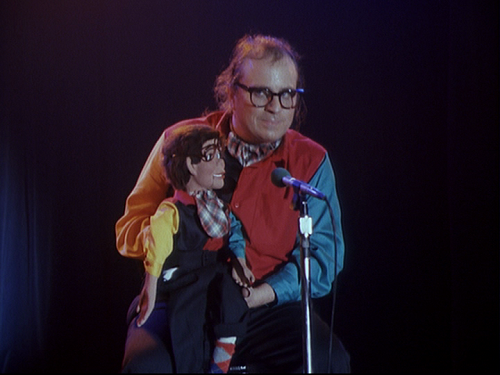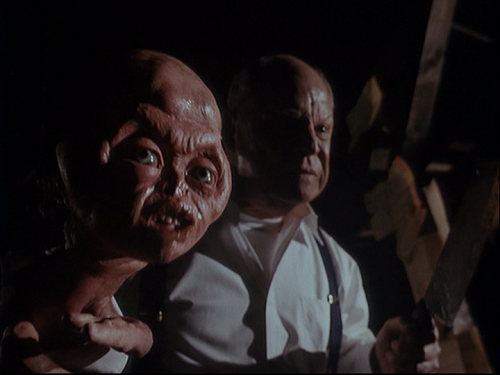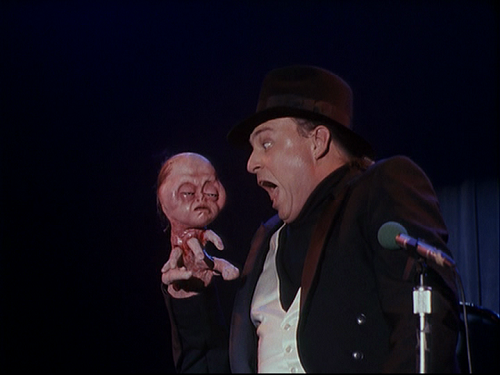
In 1989 HBO debuted Tales From the Crypt, a horror-anthology show with an unprecedented amount of tits, gore, budget, and bad puns. Based on a variety of titles from EC Comics, the episodes ranged from silly to creepy to horrible. And we’re going to review every single one of them.
——————————————————
The Ventriloquist’s Dummy (2.10)
“I’m splitting up the act!”
WHAT IS IT?
A retired ventriloquist’s dummy is more than it seems. Isn’t it always?
WHO’S RESPONSIBLE?
The 1992 Dream Team. Directing you got the legendary Richard Donner, director of Superman, Lethal Weapon, and (most importantly) my favorite Crypt episode ever, The Man Who Was Death. The teleplay was penned by the Academy Award nominated (and Heartland Film Festival Award winning) Frank Darabont, probably one of the horrors premier screenwriters (Nightmare on Elm Street Part 3, The Blob, The Mist). In front of the camera we get two fun performances from ingeniously cast comedians Bobcat Goldthwait and Don Rickles.
HOW IS IT?
One of the best. I have a fond place in my heart for Ventriloquist dummy stories. It started at an early age with the classic Goosebumps book (or as classic as a Goosebumps book can be) “Night of the Living Dummy” but it quickly moved on to more “mature” ventriloquist dummy horror like the Anthony Hopkins cult classic Magic and the Twilight Zone episode The Dummy. Ventriloquist dummies take the inate creepiness of dolls and couple it with the apparent sentience and an irreversibly foul-nature. Their lifeless eyes and agape mouths are the things of nightmares. So complete is their power that they can make unfunny racists into multi-millionaire entertainers who sell out arenas. Even the evocation of Ventriloquism can give a silly film like Killer Klowns From Outer Space a truly disturbing scene. Fans of that film will know what I’m talking about, because the scene in question has likely left a scar on their brain. Suffice to say, dummies is a powerful thing, if you’ll allow me to grossly paraphrase Bamboozled.
The episode opens with a demonstration of that power where, back in 1950-something, a ventriloquist known as Mr. Ingels (Don Rickles) and his helium-voiced dummy Morty is killing the audience with the kind of “classic” jokes you might find in a joke-book in your elementary school library. But you don’t cast Don Rickles to pretend to tell knock-knocks, so halfway through he forgets Morty and breaks character to Rickle around onstage, throwing comedic insults at the audience. Though there may be some common ground between the insult comic and the ventriloquist, seeing them back to back is a really bizarre experience. But I’m a Rickles fan, so I’m willing to be an apologist and say I enjoyed it anyway. Backstage after the show his biggest fan, little 12 year-old Billy Goldman tells Ingels that he wants to grow up to be a ventriloquist just like him. Ingels politely tells him that if he ever needs a few tips, to look him up. The lies we tell twelve year olds. In his dressing room, a ventriloquism groupie (don’t laugh, ventriloquists have powerful mouths) shows up and asks if their date is still on. Ingels is having cold feet, but Morty pipes up and invites her to their bungalow. At home little Billy Goldman is practicing his ventriloquism when a fire starts at the bungalows across the street from his house, which happens to be where Mr. Ingels lives and kills the groupie he was with. They live across the street from each other? Hey, maybe Mr. Ingels’ invitation wasn’t bullshit after all.
We now flash-forward a couple decades with a squirrelly 40-year-old Billy Goldman (Bobcat Goldthwait) visiting Mr. Ingels, now retired and recluse. I subscribe to the belief that people grow into their names, and when your given name is Billy Goldman, you really have no choice but to become an awkward man-child, which is good because it’s the only character Bobcat Goldthwait plays. Billy’s an amateur ventriloquist himself now, and wants Ingels to see him perform at an amateur night . But Ingels is done with that life, having lost his right hand in the fire. He can’t use his left hand, he says, because the right was “where the magic was”. If that wasn’t a masturbation joke already, it is now. Billy’s a persistant little grease smear, though, and after a brief impassioned speech Ingels says that he’ll think about it.
We now go to the open mic where, after one of the silliest and most adorable baton-twirling renditions of Camptown Races in public domain music history, Billy’s up. Here lies the genius of the casting. In the early days of his stand-up Bobcat Goldthwait was an Andy Kaufman type character who made himself appear nervous and unprepared, stepping on punchlines and forgetting his act. The same way that Ingels’ act was nothing more than Don Rickles holding a dummy, Billy Goldman’s act is simply Bobcat Goldthwait’s early act, except instead of a comedian bombing it’s a ventriloquist bombing, which is twice as painful and three times as funny. Billy spots Ingels in the audience and tries to introduce him to the crowd, but at that point everything coming out of his mouth is just fueling the audiences’ hatred. After the show Billy meets at a bar with Ingels who tenderly suggests that Billy was the worst fucking thing he had ever seen on a stage and he should give up. Billy, already despondent, agrees, apologizes for wasting Ingels’ time, and leaves. Then suddenly Ingels’ right hand begins to shake and Ingels begins to struggle, trying to steady his hand before giving up. He turns to the the most hilariously over-the-top bar floozie you’ve ever seen and asks if he can buy her a drink.
Billy is stumbling home, cursing the Gods of Ventriloquism when he stumbles upon a murdered woman in a car covered in gasoline, with nearby bystanders yelling “He got away! He got away!” to no one in particular. The Gods of Ventriloquism may hate him, but the Gods of Leaps in Logic decide to shower him with their gifts and he instantly knows whose responsible for all of this. He rushes back to Mr. Ingels (for the record, I’m really getting tired of Crypt episodes where the characters don’t have first names) who is shooting up morphine into his right arm. Billy accuses him of being a junkie, killing the groupie in the bungalow thirty years ago, covering it up with the fire, killing the floozie from the bar, and trying to cover THAT up with a fire before he got spotted. Ingels pleads that it wasn’t him, it was Morty. Being an aspiring ventriloquist Billy’s aware of how many of them inevitably turn to murder and how every one goes with the “It wasn’t me, it was the dummy!” defense. Nearly as popular as the “you got the wrong twin” defense. Billy goes to Morty’s box to prove Ingels wrong only to find that the only things in there are little clothes, a fake body and a mask.
Up to this point, the episode has been well-acted, funny, maybe even a little suspenseful. But it’s all been a ruse, a mere prelude to this scene, where the rubber really hits the pavement. In one of the greatest twists in Tales From the Crypt history, Morty isn’t a dummy at all but Ingels’ twin brother, conjoined at the arm. The Morty puppet is hysterical, looking like a slimy penis with arms and Rickles, to his credit, really sells the reveal, revelling in the lunacy of it all. Ingels and Morty stalk Billy through the house with a cleaver as Ingels explains how they were born like this, how Morty hates women(?), and how he was using the morphine to keep Morty in check. But when Morty begins to take credit for the whole act, calling his brother a moron and, even worse, a straight-man, Ingels can take no more and furiously chops Morty off of his body. For the next five minutes we are treated to Richard Donner playing out an homage to Evil Dead 2, Basketcase, and 80’s splatstick in general. A mere play-by-play can’t do this amazing scene justice but the highlights include Don Rickle’s throat being ripped out, the Morty puppet hilariously scurrying around the kitchen floor, and Bobcat Goldthwait destroying a kitchen with a baseball bat.
Eventually, after accidentally cracking Ingels right in the skull, Billy finally gets a direct hit on Morty, sending him flying into a meat grinder. Billy begins to grind Morty up (to make “an asshole casserole”) until Morty begs Billy to stop, promising that he’ll do anything. Billy takes him up his offer, stealing Ingels’ act with Morty as his ventriloquist dummy. It looks like everything’s going great until Morty starts to flirt with a woman in the audience, Billy begins to lose his cool and threaten him. The two fight onstage, to the delight of the audience, until Morty merges with his arm so the two will be stuck together forever. How exactly did Morty merge with Billy’s arm? Well, I guess that’s for you to decide. I like to imagine it was The Shunting, personally. Fits the 80’s vibe of the episode.
HOW EVIL ARE THE WOMEN?
I suppose the fact that all the female characters are groupies and floozies could be construed as sexist, but that’s a stretch, since they’re such small roles. Morty may hate women, but this episode doesn’t.
ALSO WORTH NOTHING:
*Like The Man Who Was Death, Donner has a cameo here, this time as a drunk at the bar. And he’s making out with Don Rickles’ daughter to boot! Double cameo!
*There’s no credit for the voice of Morty, so I like to imagine that Don Rickles did the voice himself.
*The splatstick sequence is probably my favorite in the entire series.
WORST CRYPTKEEPER JOKE:
“Billy deserves a big hand, don’t you think?”
Grade: A-
John Says:
The casting of Rickles and Goldthwait sets up the expectation of a comedy episode, and it has its moments, to be sure. But it also has a nice grim quality to it, and is probably a lot less funny than, say, Donner’s last one, the Joe Pantoliano carny show. Evil Dead stuff notwithstanding, everyone here is a haunted resentful failure, and the weight of this comes across, epecially in Rickles. There’s a period Catskills Jewish comedy vibe here that’s never stressed too hard, and I really like the choice to make Goldthwait a terrible performer. It’s established that ventriloqiusm was a life long passion for him and watching him ass his way through his agonizing set plays like a David Brent monologue. I’m not wild about the very ending, nonsensical as it is, but it’s a fun ride abetted by witty casting and gross makeup effects.


